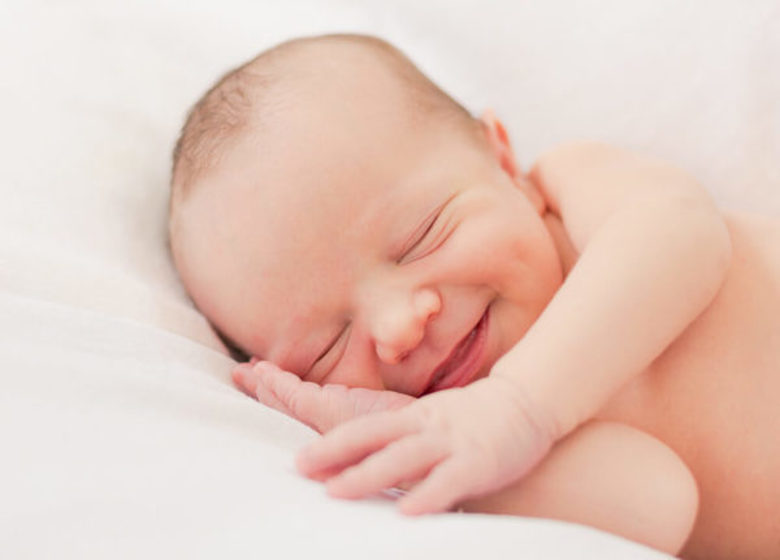Why do babies Smile in their Sleep?
It can be the most special sight observing your baby smiling while sleeping. Babies smiling or laughing in their sleep may be quite unexpected but not unusual. Also, some babies tend to simply smile more in comparison to others.
Babies usually don’t start social smiling until about eight months, but their smiles can still say a lot before then. In fact, babies smile when they’re asleep from birth.
Babies are likely to smile or laugh in their sleep because of the following reasons:
1. Developing Emotions
During their awake moments, babies may be continually getting exposed to new sounds and sights. Their developing brains may be recording all the daily experiences and information coming their way which possibly gets processed while they sleep. The happy emotions felt while dealing with the new knowledge and their understanding of it may get exhibited through smiles or laughter in their sleep. Smiling or laughing in their sleep may be a part of baby’s process of evolving emotions.
2. Passing Gas
Few experts believe that babies start displaying social smiles only after they turn 3 to 4 months old. But any occurrence of smiles in the first few weeks of baby’s birth may infer that the baby is probably passing gas. This notion is however not supported by any concrete scientific research. Nevertheless, it is a known fact that colic babies tend to remain irritable and farting brings relief and helps them feel better.
3. REM Sleep Phase
During your baby’s REM sleep he can experience certain physiological changes that trigger some reflexes and one of them maybe a smile. REM sleep phase may also result in rapid eye movements (REMs) and vivid dreams. In case you happen to notice your baby smiling or laughing in his sleep he may quite possibly be experiencing REM sleep recalling some funny episode that occurred earlier in the day.
4. Other Medical Causes
There can be certain very rare occasions when convulsions and fits may manifest as unceasing laughter. In case you perceive other symptoms like your baby losing weight or having trouble sleeping, frequent bouts of irritability or laughs for no apparent reason refer to a doctor immediately. The occurrence of convulsive laughter episodes can disrupt your baby’s rest times negatively impacting your baby’s health.
Initial stages of baby’s smile
With time, your baby’s gummy grins will transform into ways of expressing pleasure, communicating with you and developing a sense of humor. Here are some of the initial stages.
0-6 Weeks: Reflexive Smile
You’ll spot your new-born’s first grin when they are asleep. You’ll see them twitch, startle, and suddenly – is that a smile? During REM sleep your baby’s body goes through physiological changes that activate certain reflexes, and one of those is a smile. At this point it’s probably just a physical reaction, not an emotional sign.
6-8 Weeks: Responsive Smile
As your baby grows, they’ll start to smile at things they find pleasurable – cuddles, voices, and faces. But don’t expect too much at this stage. Their smile is a reaction to sensory experiences, not a social response. You might like to think this smile is some sort of acknowledgment that you are the best parent in the world. Of course, you are! But these smiles aren’t proof of it right now. Your baby doesn’t have a clear sense yet of who you are.
Still, you can try to encourage a smile. You’ll learn what noises and expressions get them to respond. Give your baby plenty of opportunities to study your face while you talk gently to them. Imitate their expressions, and they may start to imitate yours.
2-3 Months: Social Smile
Up until now, your baby’s smiles have been internal reactions to things that catch his attention. Not anymore: At this stage, they want to connect. Your baby will smile when they see you and will react when you make silly sounds (try mooing, oinking, and beeping). they’ll also learn that they can get a reaction from you by smiling — not just by crying. The gurgling, the grunting, the strange humming are all attempts by your baby to express themselves. They’ll also respond to you by getting their whole body in on the act – moving their arms and legs for emphasis.
Remember, though, that your baby won’t always smile when you want them to and that they also have to express other emotions. But if they haven’t smiled at all by 12 weeks, tell your pediatrician so that they can check for developmental delays.
How to Encourage Your Baby to Smile?
- Since your baby is near-sighted, you should get up close and personal. Be dramatic and over the top so they can make out what you are doing to see that little smile and constantly talk to them and communicate how much you love their smiles.
- Communication is key as mentioned earlier. They rely on the aural world to figure out what is going on and what is good or bad. So, talk to your baby and let them mirror your behavior. Your grin should be a wide one so they can see it and they are likely to smile back at you.
- Engage your baby with toys and games as they are likely to respond to these with a smile. Peekaboo may make you feel silly but they react to it with surprise and excitement. It also has the added bonus of all that excitement tuckering them out so they nap easier. Introduce them to new toys that make noises that they love.
- Try getting physical by tickling them or blowing raspberries on their belly. They are bound to squeal and giggle about this. And there’s your smile!
Your little one is on a fresh new journey and is setting out into the world. Enjoy this phase before they quickly transition into the next.













